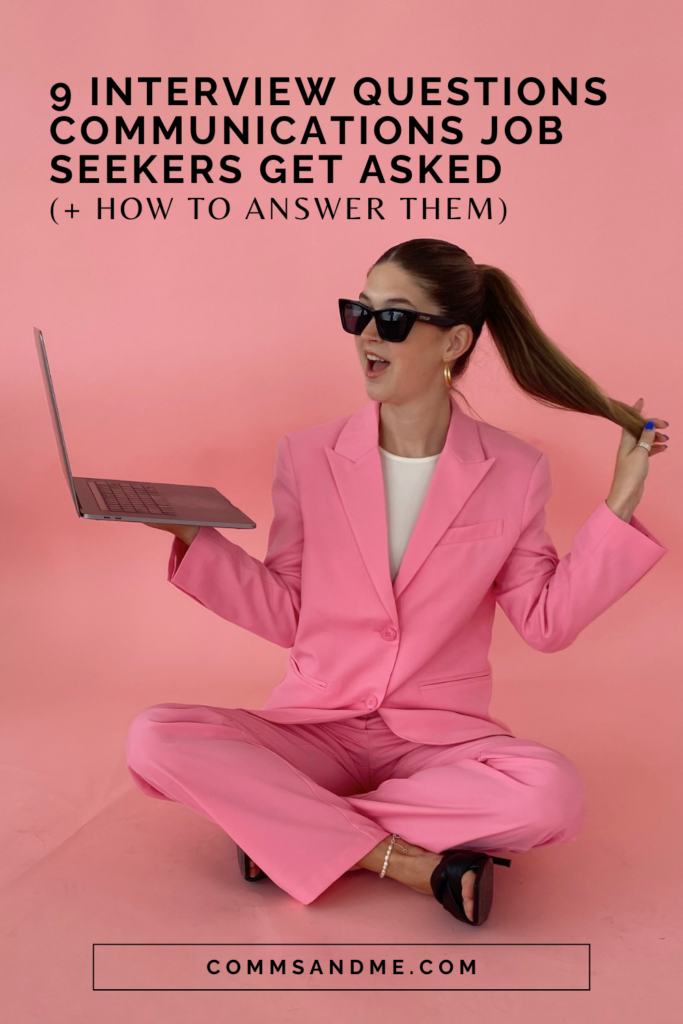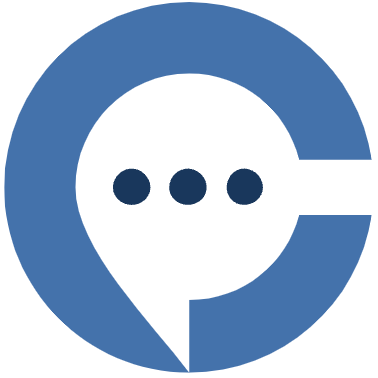9 Interview Questions Communications Job Seekers Get Asked (+ How to Answer Them)

Whether you’re applying for a summer internship, or have recently graduated and are looking for your first comms job, this list of interview questions will prepare you for the next step in your communications career.
Over the past five years, I’ve interviewed for more than 30 communications jobs, and have compiled a list of all the questions I’ve been asked by employers. Now, I’m sharing some of the most common questions I’ve been asked and the best ways to answer them to secure your next job in communications.
No matter what field of communications you’re in, you’re bound to be asked these questions. So, here are nine REAL interview questions that comms job seekers get asked, and how to answer them to get the job!
9 REAL Interview Questions Communications Job Seekers Get Asked
1. Tell us about yourself.
If there’s only one question I can almost GUARANTEE you’ll get asked, it’s this one. Almost every interview I’ve done has started with the employer saying something along the lines of: “To get started, why don’t you tell us a little bit about yourself?”
It’s a very simple question, but it’s often one of the most complicated for interviewees to answer.
The best way to answer this question is to use the Present-Past-Future formula.
Use the Present-Past-Future formula to describe what you’re currently doing (present), what you’ve done previously (past), and what you’d like to do next (future).
The key to successfully answering this question is to tell a story that’s relevant and concise. In general, you should aim to answer this question within 30 seconds to 2 minutes.
2. What’s your writing process?
Most communications roles focus heavily on content writing. Employers ask this question to learn more about how you structure your writing process and if it’s a good match for their team.
The best and truly only way to answer this question is to start by analyzing your own writing process. Ask yourself how you break up your writing tasks, what order you write in, and what general steps you follow when writing.
Make sure to touch on the importance of adjusting your writing process to match the audience and tone, as well as how your writing process might change depending on the content (e.g., newsletters, blog posts, etc.)
3. Tell us about a time when you had a tight deadline.
Employers ask this question to learn about your time management skills and ability to prioritize tasks when under pressure.
When answering this question, make sure to choose and describe a specific time in your career (or if not, school) when you were faced with a tight deadline and the steps you took to meet it.
You should answer this question in three steps:
- Explain specifically the work and deadline you were faced with.
- Break down the steps and methods you took to meet the deadline.
- Share the outcome and what you accomplished by meeting the deadline.
4. Where do you see yourself in five years?
This question is asked to understand your career progression and long-term goals.
A successful answer to this question would align the individual’s career goals with the company’s plan and growth prospects. The interviewee should highlight the type of role they see themself in, as well as the skills they hope to gain.
Don’t forget: always make sure to stay realistic and authentic with your answer. Although your answer should tie itself to the company’s vision, employers can also tell when you’re being disingenuous just to please them.
5. What do you know about our company?
From my personal experience, this is one of the most stressful questions to be asked. It’s one of the few questions where the employer is already an expert on the topic (the company) and you must learn as much as you can to prove you’re equally as knowledgeable.
Prepare in advance by researching the company’s “About Us”, “What We Do”, and “Mission and Values” pages.
When the time comes to answer this question, give a brief overview of the company’s background, highlight a couple of facts about its success and achievements, and express interest and enthusiasm in the company’s vision.
Comms&Me Tip: when interviewing for a communications role, it’s important to remember to explore the company’s social media accounts. This will help you not only understand the company but also, how they present themselves to their audience.
6. How do you approach group projects?
Working in communications will almost always guarantee teamwork and lots of collaboration with coworkers on projects.
Employers will be looking for an answer that highlights strong listening and collaboration skills. Feel free to give a specific example of a time when you worked on a group project at work or school.
This question also typically involves the employer asking what type of role you usually take in group projects. Once again, you should highlight your ability to listen and exchange ideas openly in a group setting. Although employers will value employees with strong leadership skills, it is also important to ensure that you demonstrate being a team player who contributes and listens equally on projects.
7. Have you ever made a communication plan? Give an example.
A communication plan is a document that teams and companies use to plan their communication strategy and target audience messaging for a given project or campaign. Communication plans are usually the backbone of a project and are key to developing a successful communication product.
Be prepared for employers to ask you about your experience working and/or writing various communication products like communication plans.
If you’ve made a communication plan before, make sure to explain in the interview what your writing process was, the project you wrote the plan for, as well as how it helped achieve project success.
If you’ve never made a communication plan before, focus on explaining how you would hypothetically write a communication plan for a project in line with the company’s mission. Mention the skills and experience you do have and how you would leverage that to make a successful communication plan.
8. What software and tools do you have experience with?
Communications teams are always working with the latest writing, design and project management tools. Some of the most common tools and software I’ve seen used by communications teams are Microsoft Office, Adobe Creative Suite tools, Canva, Google Analytics, Hootsuite, etc.
Keep a running list of the tools and software you’ve used, and highlight how you used them in previous projects when asked in your interview.
Comms&Me Tip: many popular tools and software, like Canva, are free. If you don’t have experience with the company’s suggested tools, download them or create a free account and start testing them out!
9. What are some of your hobbies and interests?
Employers usually ask this question towards the end of the interview to get a bigger picture of the candidate and learn about their personality.
This question is a great time to let your personality shine and express any interests and passions you have. Remember to think about interests you have that are also unrelated to work which will help show the employer that you’re well-rounded.
Oftentimes, I’ve found that this question helps me bond with the employer who may also have similar interests.
Any other communications interview questions I missed?
Leave a comment under this post with some of the most common questions you’ve received in interviews.
Don’t forget this last Comms&Me tip: as you go through the job search and interview process, keep a running list of all the interview questions you’ve been asked to stay prepared for future roles!

3 comments
Comments are closed.

As a communication student, I want to thank you for this insightful post! 🙂 I’m gonna keep those questions in mind as I start applying for internships next year.
Thanks Giada! This comment means so much to me, glad you liked it 🙂
Really great post! These tips can be applied to many different fields. Thank you!